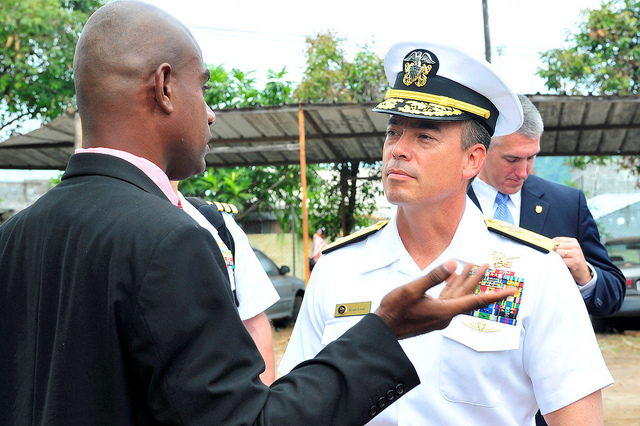The top lawmakers on the Senate Armed Services Committee have urged Navy leaders to block a promotion for the admiral in charge of the service’s elite SEAL teams, citing reports that the commander retaliated against suspected whistleblowers.
Sens. John McCain (R-Ariz.) and Jack Reed (D-R.I.), the chairman and ranking Democrat on the panel, respectively, sent a joint letter to Navy Secretary Ray Mabus last month saying they had “deep reservations” about a pending promotion for Rear Adm. Brian K. Losey, the leader of the Naval Special Warfare Command.
The letter from McCain and Reed is the latest—and perhaps most forceful—effort by lawmakers to pressure the Navy to freeze Losey’s advancement.
The Washington Post reported in October that the Navy was poised to promote Losey to become a two-star admiral even though Pentagon investigators had determined that he illegally demoted or punished three subordinates during a vengeful but fruitless hunt for an anonymous whistleblower who had reported him for a minor travel-policy infraction.
The Defense Department Inspector General concluded in three separate investigations that Losey had violated whistleblower-protection laws. Navy leaders rejected those findings last fall and decided not to discipline Losey, accepting his explanation that he had taken action against the three staff members not out of retaliation, but because they were poor performers.
Losey, a prominent figure in the military’s secretive Special Operations forces, once commanded SEAL Team 6, the clandestine unit known for killing terrorist targets such as Osama bin Laden. He has served in Afghanistan, Iraq, Panama, Bosnia, Somalia and other conflict zones, and once worked as a top military aide in the White House.
In their Jan. 14 letter, McCain and Reed said they were “especially troubled” that the Navy would consider promoting Losey even though “he created exactly the type of negative command climate that is so harmful to our military.”
Other lawmakers have also expressed concern. In December, Sen. Ron Wyden (D-Ore.) said he would block the Navy’s nomination of a new undersecretary—the service’s second highest-ranking civilian leader— until it re-examined Losey’s status.
Navy officials have defended their decision not to take action against Losey in the whistleblower cases, disputing the evidence that he acted improperly. Losey has also vigorously denied wrongdoing.
Read more at The Washington Post
Already have an account? Sign In
Two ways to continue to read this article.
Subscribe
$1.99
every 4 weeks
- Unlimited access to all articles
- Support independent journalism
- Ad-free reading experience
Subscribe Now
Recurring Monthly. Cancel Anytime.
that the Navy was poised to promote Losey to become a two-star admiral even though Pentagon investigators had determined that he illegally demoted or punished three subordinates during a vengeful but fruitless hunt for an anonymous whistleblower who had reported him for a minor travel-policy infraction.
The Defense Department Inspector General concluded in three separate investigations that Losey had violated whistleblower-protection laws. Navy leaders rejected those findings last fall and decided not to discipline Losey, accepting his explanation that he had taken action against the three staff members not out of retaliation, but because they were poor performers.
Losey, a prominent figure in the military’s secretive Special Operations forces, once commanded SEAL Team 6, the clandestine unit known for killing terrorist targets such as Osama bin Laden. He has served in Afghanistan, Iraq, Panama, Bosnia, Somalia and other conflict zones, and once worked as a top military aide in the White House.
In their Jan. 14 letter, McCain and Reed said they were “especially troubled” that the Navy would consider promoting Losey even though “he created exactly the type of negative command climate that is so harmful to our military.”
Other lawmakers have also expressed concern. In December, Sen. Ron Wyden (D-Ore.) said he would block the Navy’s nomination of a new undersecretary—the service’s second highest-ranking civilian leader— until it re-examined Losey’s status.
Navy officials have defended their decision not to take action against Losey in the whistleblower cases, disputing the evidence that he acted improperly. Losey has also vigorously denied wrongdoing.
Read more at The Washington Post










COMMENTS